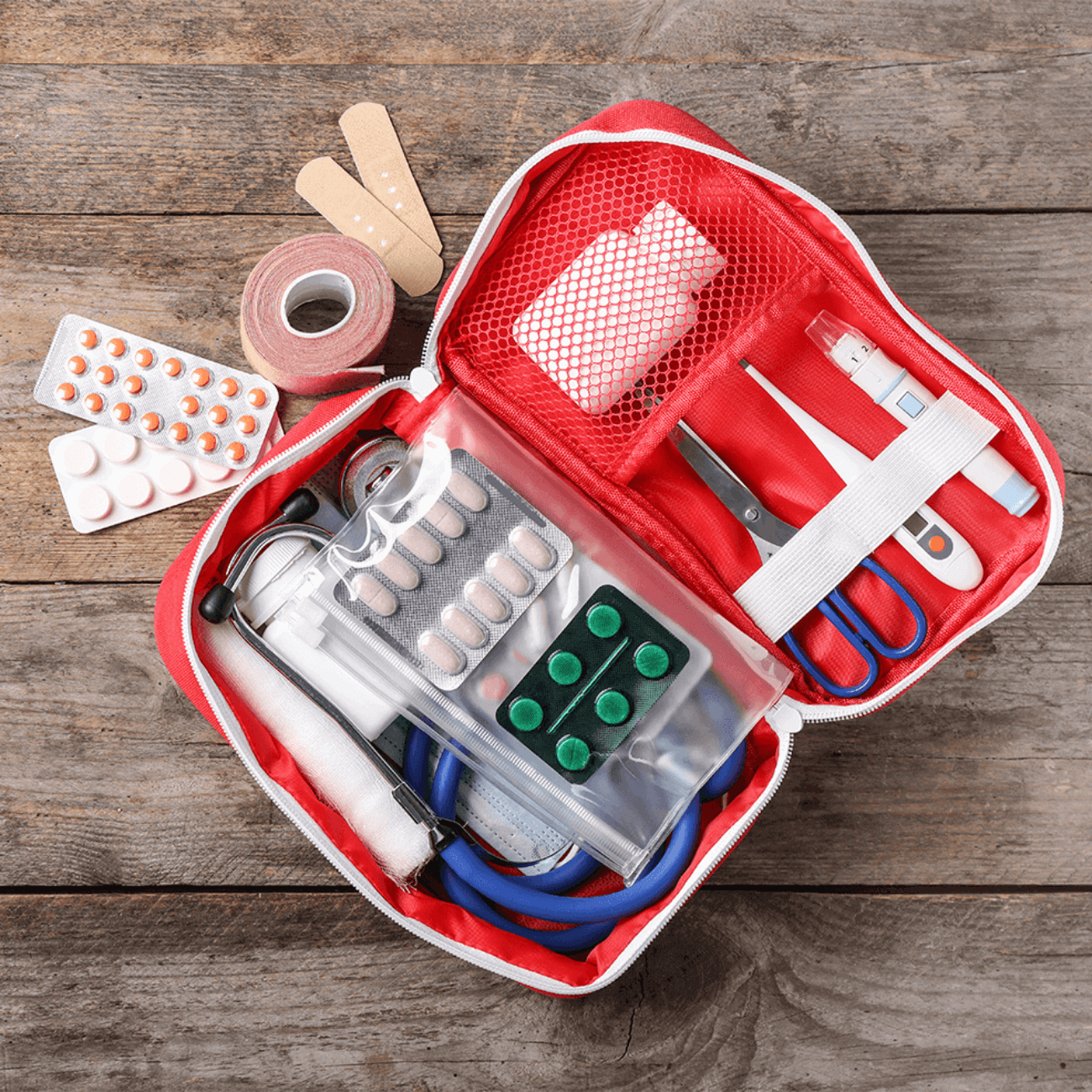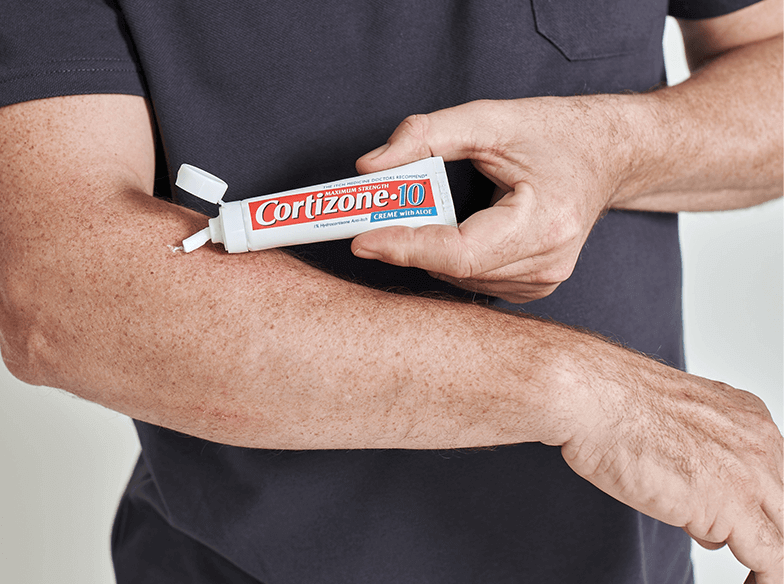
SCRATCHING THE SURFACE
Get the ins and outs of itch. Learn about the types and causes, how to avoid it, and how to relieve it.
The simple truth is that all kinds of things can make you itch. From the zipper on your hoodie to a flying insect, there are all sorts of evil forces out there trying to get under your skin.
Some causes of itch are more serious than others — just ask one of the more than 31 million people in the US who suffer from eczema.1 Psoriasis and dry patches can also cause discomfort that manifests itself as rough, itchy skin.2
But for every cause of itch, there’s are several treatments. The first step is identifying the culprit (or culprits). Then comes making a change to alleviate the discomfort. Sometimes it’s as easy as switching detergents; and for those other times when preventative measures don’t work (dang mosquitoes!), there are over-the-counter solutions that can help relieve the itch.
AN OVERVIEW OF ITCH

As far as what you should include, the basic list is pretty long — but better safe than sorry. Check out this list published by the Red Cross, and consider printing out a copy when you put together your first aid kits. It contains all the things you’d expect, like bandages and antibiotic ointment, plus a few things you might not expect, like a hydrocortisone-based product like Cortizone-10®.1
In broad terms, itch is defined as “a tingling or irritation of the skin that makes you want to scratch the area.”3 When we think of itch, what comes to mind are things like mosquito bites, poison ivy, and detergent.
But in order to understand itch (and help figure out how to stop scratching), we need to zoom out a little. The most common causes of itch can be loosely organized into these four types:2
Very dry skin
Bug bites
Itchy skin conditions
Allergic skin reactions
TYPES OF ITCH

To figure out what to do about itch, it helps to first identify the cause. Here’s a look at what to watch out for with some of the most common types of itch, and how to relieve them. Plus a few ideas on how to keep the itch from coming back.
VERY DRY SKIN
The medical term for dry skin is xerosis.4 Simply put, dry skin is skin that doesn’t have enough moisture to keep it feeling soft. In most cases, very dry skin can be relieved by applying moisturizer to the affected area, making sure to rub it in completely.
The most common causes of dry skin include:
Climate. Dry, desert-like climates have less natural moisture in the air. This lack of humidity can increase the likelihood of dry skin for people who live in or visit these climates.4
Genetics. Skin conditions can be passed down from generation to generation.4 These include eczema and psoriasis, which will be discussed in the Itchy skin conditions section below.
Health conditions. Certain illnesses can cause dry, itchy skin. These include psoriasis, eczema, diabetes, and kidney disease.
Occupations. Healthcare providers and hairstylists are more likely to develop dry skin because they wash their hands frequently. People who work outside also have an increased risk.4
BUG BITES
With mosquito bites, the cause is usually obvious and the itch tends to go away quickly.3 Our article on outdoor living has some helpful information on how to deal with mosquitoes. (Spoiler alert: Those citronella candles we’ve been using? Turns out they’re good at setting a festive mood but not so good at keeping bugs away.)
Things get a little trickier (and ickier) when we start looking at bed bugs, lice, and mites. These nasty little buggers can live on your skin and cause long-lasting itch that’s very hard to control.3
Bed bugs. If you’re waking up in the morning with little red welts and fear it might be bed bugs, check with a dermatologist to help determine if that’s the case. To get rid of them, the Centers for Disease Control and Prevention (CDC) recommends using a professional pest control company that has experience treating bed bugs.5
Head lice. Despite what you may think (and the fact that even saying the word “lice” can make your head itch), having head lice does not mean you’re dirty. It’s typically transferred by close contact with someone who has lice. And while lice don’t carry disease,6 the itching can be really annoying. At-home treatments are effective, and there are also special barbershops that specialize in lice removal.
Mites. Mites can cause a skin condition called scabies, which can be very itchy indeed. Most cases are caused by skin-to-skin contact, or, less frequently, from infested items like bedding, clothes, and furniture. As with lice, a case of scabies doesn’t mean you’re unclean. A dermatologist can determine whether or not you have scabies, and prescribe a course of action.7
ITCHY SKIN CONDITIONS
Eczema. Researchers believe eczema is caused by a combination of genes and triggers. And while not much can be done about the genealogy, identifying what triggers eczema can help with both avoidance and treatment. The most common triggers are metals, cigarette smoke, soaps and cleaners, fragrances, fabrics, and antibacterial ointments.8
Psoriasis. Over 7.5 million US adults are affected by psoriasis. It’s caused by an overactive immune system that speeds up skin cell growth, causing skin cells to “pile up” on the surface of the skin. Early treatment is important, as, if left unchecked, a condition called psoriatic arthritis can develop, which can lead to permanent joint damage.9
Chicken pox. Most people get chicken pox when they’re young. And although there is a highly effective vaccine, there is still a chance that kids can contract the disease. Since it’s highly contagious, if you think your child has the chicken pox, keep them home. Then follow the advice of your doctor for the best course of action. This usually involves a combination of oatmeal baths, topical ointments, and non-aspirin pain relievers.10
ALLERGIC SKIN REACTIONS
Believe it or not, one of the most common substances that can cause an allergic reaction is nickel. Which, unfortunately, is found in everyday objects like cell phones, jewelry, eyeglass frames, zippers, and belt buckles.2 We can also develop allergic skin reactions to nail polish, fragrances, detergents, shampoos, and latex.2
The bad news is that it can be tough to pin down exactly what’s causing an allergic skin reaction. Consult with a dermatologist or allergist if you are having trouble identifying the source of a skin allergy.2
The better news is that there are lots of fragrance-free and sensitive-skin formulas out there. Sometimes a simple change like switching laundry detergents can stop your favorite shirt from itching.

00:00:00.000 --> 00:00:01.534
Cortizone-10 presents...
00:00:01.534 --> 00:00:04.304
What's the Right Fix When You Get An Itch?
00:00:04.304 --> 00:00:05.839
Has this ever happened to you?
00:00:05.839 --> 00:00:09.642
A vicious cycle of scratching an itch
that only seems to get itchier?
00:00:09.676 --> 00:00:11.444
That's ITCHSANITY!
00:00:11.444 --> 00:00:13.813
Itching can be caused
by many different triggers...
00:00:13.813 --> 00:00:17.450
...which cause inflammation
— that redness and irritation of the skin —
00:00:17.784 --> 00:00:20.787
...Which you scratch, opening the skin
to more irritants...
00:00:20.887 --> 00:00:24.190
leading to more itchiness:
the itch-scratch cycle.
00:00:24.391 --> 00:00:27.961
And there are plenty of anti-itch
products, but they don't all work
00:00:27.961 --> 00:00:28.895
the same way.
00:00:28.895 --> 00:00:29.596
Some numb
00:00:29.596 --> 00:00:33.833
the surface of the skin. Other anti-itch
creams block histamine reactions.
00:00:33.833 --> 00:00:36.403
Cortizone-10 works differently.
00:00:36.403 --> 00:00:41.374
It works on more causes of itch to quickly
reduce inflammation, soothe irritation,
00:00:41.374 --> 00:00:45.011
and restore the skin barrier
to prevent more irritants from entering.
00:00:45.011 --> 00:00:47.947
And, it has the maximum amount
of hydrocortisone available
00:00:47.947 --> 00:00:50.950
without a prescription,
working fast to relieve itching.
00:00:51.751 --> 00:00:53.219
STOP THE ITCHSANITY
00:00:53.219 --> 00:00:57.023
with the #1 Doctor Recommended
Brand for itch relief, Cortizone-10.
00:00:57.023 --> 00:00:59.759
Cortizone-10. Works fast and lasts.
10 TIME-TESTED TIPS
The National Eczema Association knows a thing or two about itch. And they offer the following 10 tips for itch relief:11
Use skin cleansers with low pH
Apply a cold compress
Understand and avoid your itch triggers
Pinch and pat the itchy skin (rather than scratching)
Take an apple cider vinegar bath or dilute it and add to a cold compress
Wear soft, breathable, natural clothing next to your skin
Avoid sitting on grass, plastic chairs, or rough carpet and upholstery with bare legs
Try acupuncture
Do wet wrap therapy
Moisturize frequently throughout the day with an ointment that contains ceramides
CORTIZONE-10® IS HERE TO FIGHT ITCH
Maximum Strength Itch Relief Lotion for Eczema contains the maximum-strength hydrocortisone available over the counter. It’s specially formulated to help relieve the itching and discomfort associated with minor skin irritations, rashes, and inflammation due to eczema.
Maximum Strength Itch Relief Lotion for Diabetics' Skin contains maximum-strength hydrocortisone. It’s clinically tested and shown to be non-irritating on diabetics' skin when used as directed.
Maximum Strength Overnight Itch Relief Cream is formulated with hydrocortisone to calm and soothe itch while you sleep.
Maximum Strength Ultra Moisturizing Anti-Itch Cream contains 10 moisturizers to make skin feel softer. It helps relieve itch associated with minor skin irritations and rashes due to insect bites, poison ivy, psoriasis, and more.
Maximum Strength Itch Relief Cream With Aloe contains maximum-strength hydrocortisone and aloe to help soothe your skin. It’s great for relieving itch associated with minor skin irritations due to insect bites, poison ivy, and more.
Maximum Strength Itch Relief Cooling Gel brings a cooling sensation and cools skin on contact. Helps relieve itch associated with minor skin irritations, inflammation, and rashes due to insect bites, poison ivy, eczema, psoriasis, and more.
Maximum Strength Itch Relief Easy Relief Applicator It’s the no-mess way to help relieve itch associated with minor skin irritations and rashes due to insect bites, poison ivy, psoriasis, and more.
*2024 IQVIA Study
REFERENCES
1. Nationaleczema.org, editors. Eczema stats, 2021. National Eczema Association.
2. AAD.org, editors. 10 REASONS YOUR SKIN ITCHES UNCONTROLLABLY AND HOW TO GET RELIEF. American Academy of Dermatology Association.
3. Medlineplus.gov, editors. Itching. Medline Plus, US National Library of Medicine.
4. Clevelandclinic.org, editors. Dry Skin. Cleveland Clinic.
5. AAD.org, editors. BED BUGS: OVERVIEW. American Academy of Dermatology Association.
6. AAD.org, editors. HEAD LICE: OVERVIEW. American Academy of Dermatology Association.
7. AAD.org, editors. SCABIES: OVERVIEW. American Academy of Dermatology Association.
8. Nationaleczema.org, editors. Eczema Causes and Triggers. National Eczema Association.
9. Psoriasis.org, editors. About Psoriasis. National Psoriasis Foundation.
10. AAD.org, editors. HOW TO CARE FOR CHILDREN WITH CHICKENPOX. American Academy of Dermatology Association.
11. Nationaleczema.org, editors. Managing Itch. National Eczema Association.


.png)

